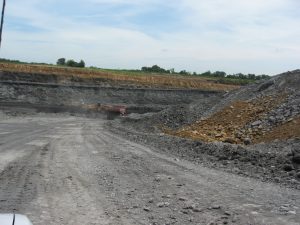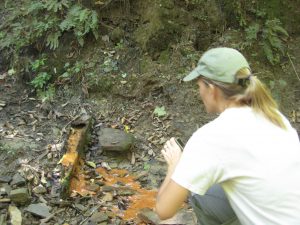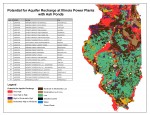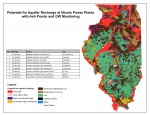The Issue

- Surface coal mine where coal ash will be buried in Wabash County.

The coal mining industry in Illinois pollutes water and damages our farmland, forests and natural watercourses. Impacts do not end with the land; our rural heritage is also being destroyed. Many families decide simply to locate elsewhere, causing the depopulation of rural communities.
In addition, coal ash disposal sites leach toxic chemicals to groundwater, where pollution can spread and pollute drinking water supplies. They are also prone to collapse, as happened near Kingston, Tennessee in 2008. Even the “cleanest” coal-burning electricity generates waste that can pose a threat to our drinking water. The state’s regulatory agencies have not held the coal industry accountable to the same standards as they do other industrial polluters, and the byzantine regulatory process precludes meaningful involvement by affected citizens.
Prairie Rivers Network’s Work

- Coal mine seepage into stream from surface mining in McDonough County.

Prairie Rivers Network has worked on these issues for the past few years, gaining initial victories and laying the groundwork for significant progress.
We have…
- negotiated tighter water pollution permits for several coal mines;
- appealed water pollution permits for two new longwall coal mines;
- provided technical assistance to two citizen groups engaged in administrative appeals of state mining permits;
- developed coalfield community organizer toolkit and a volunteer coalfield water quality monitoring program;
- hired Coal Country Organizer who has worked to develop capacity of three coalfield citizen action groups to conduct water quality monitoring and increase community awareness of coal mining impacts;
- worked with lawmakers to improve scrutiny of Illinois’ lax coal ash disposal program;
- maintained pressure on the Illinois Environmental Protection Agency to continue their investigation of coal ash disposal operations at power plant facilities;
- laid the foundation for two enforcement cases of newly discovered coal ash dumps;
- empowered citizens with knowledge and support in order to communicate concerns through comment letters and at public meetings and hearings before local, state and federal decision makers; worked closely with national groups (Environmental Integrity Project, Earthjustice and Sierra Club) to bring local stories and voices to their national campaign to improve USEPA’s coal ash disposal rules.
What Can You Do?
- Learn more about the coal mines and ash impoundments in your area.
- Volunteer to collect stories from the coalfields.
- Write letters of concern to our regulators.
- Attend a public hearing.
- Support this kind of work with your membership.
Resources for coalfield citizens:
(1) Toolkit for Developing and Managing Partnerships in Coal-Impacted Watersheds
(2) Illinois Coal Country Teams Volunteer Handbook for Monitoring Mine-Impacted Streams
Maps:
(1) Coal mines in Illinois (pdf document)
(2) Coal ash impoundment sites in Illinois (click image to enlarge)
Links:
Factsheets:
- Coal Mining in Illinois Fact Sheet
- Coal Ash Factsheet (Coming Soon)
- Coal Slurry Factsheet (Coming Soon)
Health impacts of coal and coal ash:
(1) Physicians for Social Responsibility report on Coal’s Assault on Human Health
(2) Physicians for Social Responsibility report on Report on Coal-Ash: The toxic threat to our health and environment
Staff Contacts:
- Traci Barkley, permit review, technical assistance, regional “beyond coal” organizing tbarkley @ prairierivers.org
- Brian Perbix, local group organizer bperbix @ prairierivers.org
Citizen Groups:
Canton Area Citizens for Environmental Issues










